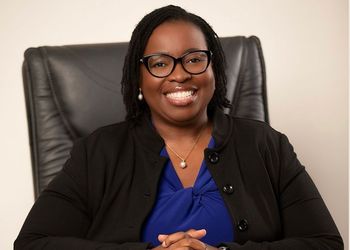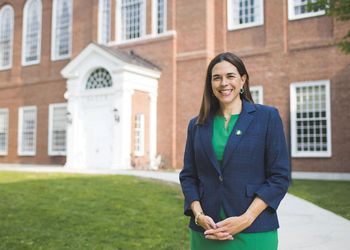The Resident Radical

The Resident Radical
Aisha Nyandoro, CEO of Springboard To Opportunities, is helping families living in affordable housing grow and succeed through resident-driven partnership.
September 24, 2022Aisha Nyandoro says that like a lot of young people from the South, she left to find her path, but the magnetic force of her hometown Jackson, Mississippi, drew her back. “I was taught you grew where you were planted,” she says. “When I finished my doctorate at MSU, I thought, I have this degree and all these tools and skills, and it’s time for me to get down to doing the work.”
Nyandoro is the CEO of Springboard To Opportunities, a nonprofit organization that provides strategic, direct support to those living in affordable housing. Springboard To Opportunities serves around 4,500 individuals annually, primarily in Mississippi.
As leader of Springboard, Nyandoro developed an approach centered around listening to the needs of the people they are reaching out to, rather than using a top-down method of administering public assistance. Nyandoro calls Springboard’s method “radically resident-driven.” The simple but often overlooked assumption is that those who are wrangling with a problem will have the best ideas for solving it. “Much of what we see in this country as it relates to poverty is that we don't center the needs of families into the conversation,” says Nyandoro. “How do we really help our moms understand that their voices matter, that they are empowered, and that they have stories that should be shared? We have to include them in the conversations around advocacy and make sure their voices are front and center.”
Springboard provides a range of services to lift up the residents it helps. That can mean partnering with food banks and health care organizations, assisting with educational needs or providing direct financial assistance. Springboard’s Magnolia Mother's Trust is the first guaranteed income project in the country focused on the needs of very low income Black mothers. It provides $1,000 per month for a year to mothers with dire need of income stability. “This is part of the larger conversation around economic justice,” says Nyandoro. “While we're doing that, we also are pushing for cash-based reform, and working to change the way we talk about and approach poverty in this country.”
Nyandoro also notes the approval of the Child Tax Credit. As part of the 2021 American Rescue Plan, the credit cut child poverty by 30% according to a Columbia University study. “It’s important to understand how poverty really works in this country,” Nyandoro says. “What I hear all the time is that people should just work harder, but some of the people in our programs already have one, even two, jobs. It’s virtually impossible for a significant subset of our country to ever get to economic self-sufficiency.”
In MSU’s Ph.D. program, Nyandoro studied ecological community psychology, which promotes understanding societies and communities in a holistic way. If the field hadn’t existed already, Nyandoro may have invented it herself. “The discipline examines the entire ecosystem of human behavior and development, and the training I received at Michigan State has been important to my success,” says Nyandoro. “When I learned about the field, I knew it was exactly what I wanted to do—design and build programs with research and evaluation in service of the community.”
And so Nyandoro—the CEO, philanthropist, wife and mother—has built a life around doing just that: ensuring others have the opportunity to grow, no matter where they’re planted.
Contributing Writer(s): Chris Quirk




